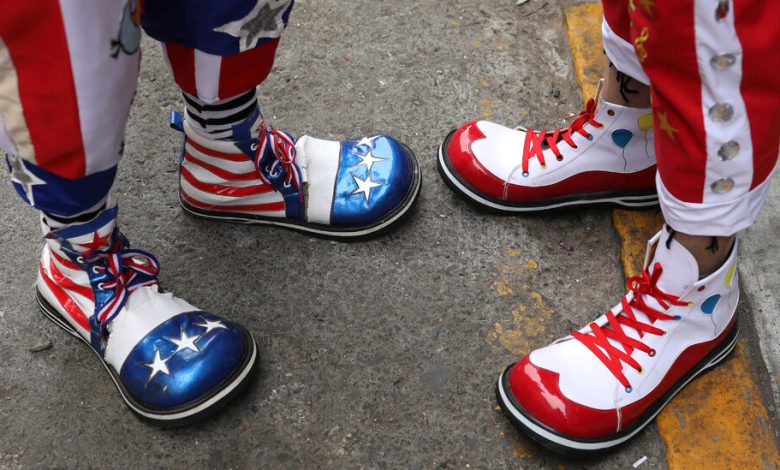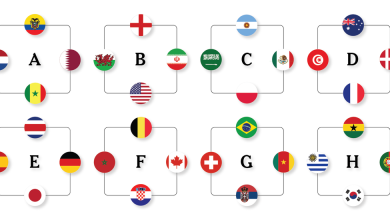Will Voters Send In the Clowns?

I’m not a historian, but as far as I know, America has never seen anything like the current political craziness. There have been bitter disputes within Congress — in 1856, Charles Sumner, an abolitionist senator, was attacked and severely injured by a pro-slavery representative. But these were conflicts between parties, and slavery was nothing if not a substantive issue.
This time, however, the craziness is entirely within the Republican Party, which has just decapitated itself, and the insurgents don’t even seem to have any coherent demands. Many people have been calling the G.O.P. a “clown car,” and understandably so. This is a party that seems incapable of governing itself, let alone governing the nation.
Yet Americans, by a wide margin, tell pollsters that Republicans would be better than Democrats at running the economy. Will they continue to believe that? The fate of the nation may depend on the answer.
Regular readers know that I’ve been trying to make sense of negative public perceptions of the economy since the beginning of last year. At the time some of the economic news was bad: Inflation was high and wages were lagging behind prices, although job growth was very good. So it made sense for Americans to be somewhat down on the economy; but it didn’t seem to make sense for views of the economy to be as negative as they had been during the depths of the 2008 financial crisis or circa 1980, when America had both high inflation and high unemployment.
Since then, however, the puzzle has become much deeper. The economic news in 2023 has been almost all good — indeed, almost surreally good. Inflation has come way down. Most measures that try to get at “underlying” inflation, extracting the signal from the noise, indicate that we may be getting close to 2 percent inflation, which is the Federal Reserve’s target. This suggests that the war on inflation has been largely won — and this victory has come without the large rise in unemployment some economists had insisted was necessary.
Furthermore, wages are no longer lagging behind inflation. Most workers’ real wages — wages adjusted for inflation — are now significantly higher than they were before the pandemic. (Pandemic-era wage numbers were distorted by large layoffs of low-wage workers.)
As a recent analysis in The Economist pointed out, given the historical relationship between economic fundamentals and sentiment, you would have expected Americans to be feeling pretty good about the economy right now. Instead, they’re feeling very gloomy — or at least telling pollsters that they feel gloomy. The Economist, not mincing words, says that “Americans’ opinions about the state of the economy have diverged from reality.” And voters appear to be more down on Democrats’ economic management than ever. Why?
There are two main stories being used to explain bad feelings about an objectively good economy.
One story is that we’re in a “vibecession,” in which people are buying into a negative narrative — to some extent purveyed by the news media — that is at odds not just with data but also with their own experience. Indeed, surveys show a huge gap between Americans’ view of their own financial situation, which is pretty good, and their views of the economy, that is, what they think is happening to other people. The notion that there’s a disconnect between perceptions of the economy and personal experience seems to be validated by the fact that consumer spending remains robust despite low economic confidence.
I’ve been particularly struck by what people say about the news they’ve been hearing. We’ve gained 13 million jobs since Joe Biden took office, yet Americans consistently report hearing more negative than positive news about employment.
That said, there’s another possible explanation for bad economic feelings: Americans may be upset that prices are high even though they’re not rising as fast as they were last year.
Now, there has to be some statute of limitations on how far back people’s sense of “normal” prices reaches; I doubt that people are angry because you can no longer get a McDonald’s hamburger for 15 cents. But public perceptions of inflation may depend on the change in prices over several years rather than the one-year-or-less numbers economists usually emphasize. And if you measure inflation over, say, the past three years, it hasn’t come down yet (which is a contrast with 1984, the year of Morning in America, when short-term inflation was around 4 percent but three-year inflation was steadily falling).
Which story is right? There’s probably some truth to both: Americans are upset about past inflation, but they also have false perceptions about the current state of the economy.
The big question politically is whether these negative views will change in time for the 2024 election. Will people finally hear about the good news? Will they still be angry in November 2024 that prices aren’t what they were in 2020?
Honestly, I have no idea. Objectively, the economy is doing well. But perceptions may not match that reality, and Americans may, as a result, vote to send in the clowns.
The Times is committed to publishing a diversity of letters to the editor. We’d like to hear what you think about this or any of our articles. Here are some tips. And here’s our email: [email protected].
Follow The New York Times Opinion section on Facebook, Twitter (@NYTopinion) and Instagram.





